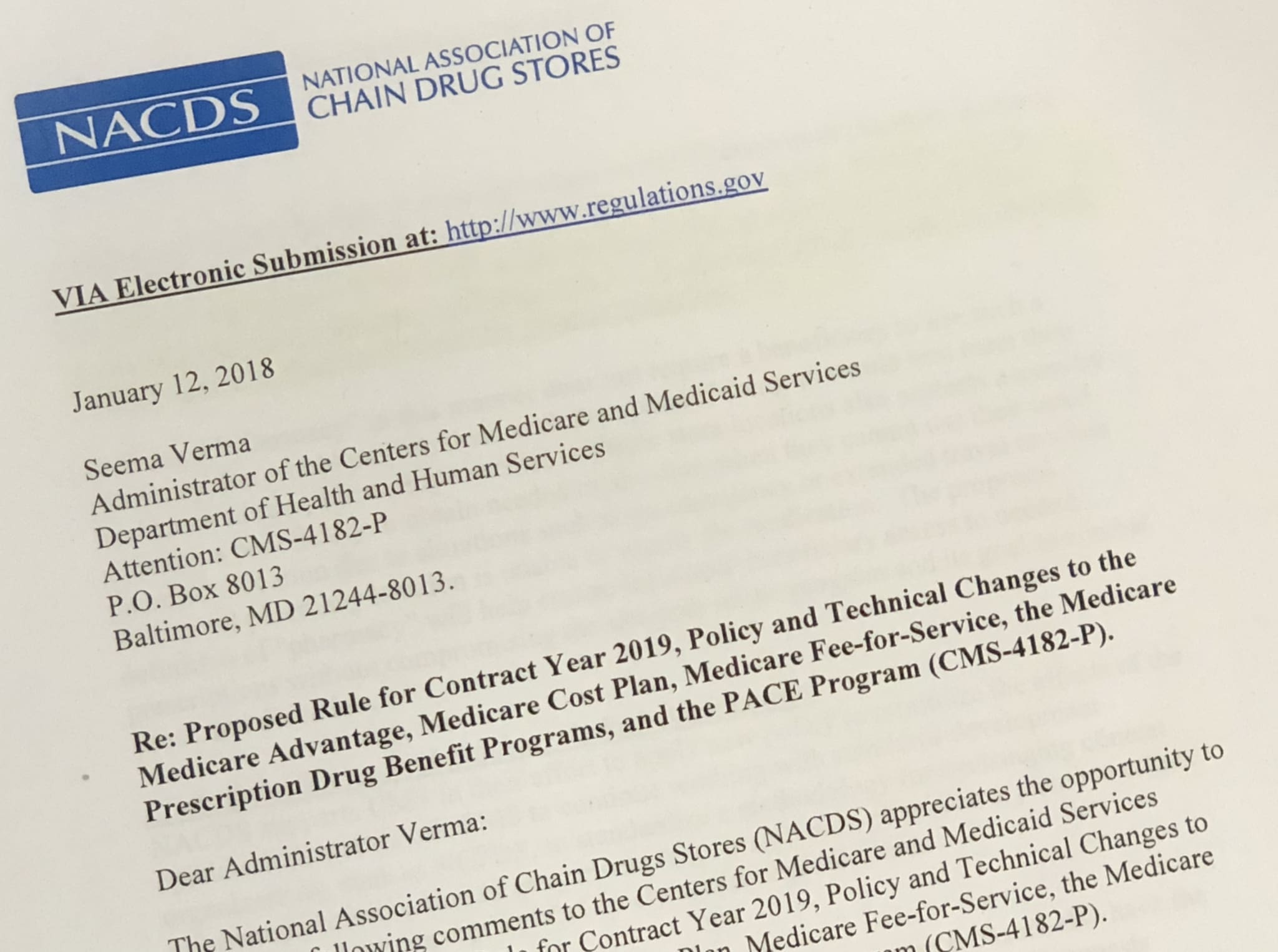
“NACDS’ comments reflect extensive member engagement, collaboration and consensus on highly complex issues – which directly affect pharmacy operations and pharmacy patient care,” said NACDS President and CEO Steven C. Anderson, IOM, CAE.
Arlington, Va. – The National Association of Chain Drug Stores (NACDS) has submitted comments to the Centers for Medicare & Medicaid Services (CMS), recommending pro-patient and pro-pharmacy policies as the agency considers Medicare Part D prescription drug program changes for contract year 2019.
NACDS expressed support for, and provided further input, on CMS’ proposed rule, which involves issues including direct and indirect remuneration (DIR) fees; advancing e-prescribing and medication therapy management (MTM); further addressing opioid issues in a pro-patient and pro-pharmacy manner; and fostering pharmacy access.
“NACDS’ comments reflect extensive member engagement, collaboration and consensus on highly complex issues – which directly affect pharmacy operations and pharmacy patient care,” said NACDS President and CEO Steven C. Anderson, IOM, CAE. “We appreciate CMS’ clear recognition of many of the topics that NACDS has raised on a consistent basis, and we appreciate this opportunity to share additional input from our pro-patient and pro-pharmacy perspective.”
• Direct and indirect remuneration (DIR) fees – NACDS acknowledged CMS’ understanding of pharmacies’ concerns about DIR fees, such that “retail pharmacies must conduct business in an environment where they are unsure if a reimbursement they received is the final reimbursement or if a fee will be applied to them at some future point.” To address this untenable situation, NACDS proposed solutions to improve the use of fees in the Medicare Part D program to reduce costs for beneficiaries and for CMS, while promoting a more quality-driven healthcare system. Logistically, NACDS’ recommendations involve specific input on: the factors involved in determining beneficiary payment and pharmacy reimbursement at the point of sale; the implementation of a meaningful and consistent pharmacy-specific pharmacy-based quality incentive program; a cap on performance-based fees; and further guidance from CMS to foster even greater transparency and consistency in the use of fees and incentives.
• Pharmacy “lock-in” programs related to opioid abuse prevention – In implementing provisions of the Comprehensive Addiction and Recovery Act of 2016, CMS proposed a definition of the term “locked-in pharmacy” that has been strongly supported by NACDS. This term refers to a plan sponsor’s “lock-in” ability to require beneficiaries who are at-risk for prescription drug abuse or misuse to obtain frequently-abused drugs from selected prescribers and/or network pharmacies. CMS’ proposed definition of “locked-in pharmacy” acknowledges that pharmacies with multiple locations that share real-time electronic data should be treated as one pharmacy – thus maintaining the spirit of the law while making appropriate allowances for patients’ convenience.
• National Council for Prescription Drug Programs (NCPDP) SCRIPT Standard for electronic prescribing – NACDS noted benefits for patients and for healthcare providers alike that are expected to result from CMS’ proposal to adopt the NCPDP SCRIPT Standard Version 2017071 as the official electronic prescribing standard for transmitting prescriptions and prescription-related information in Medicare Part D. NACDS’ comments urge a transition period to mitigate difficulties associated with the currently proposed effective date of January 1, 2019.
• MTM and the Medical Loss Ratio – NACDS reiterated its support for a CMS proposal that could further incent plans to utilize MTM programs. Under current requirements, Part D plan sponsors and Medicare Advantage plans are required to meet a medical loss ratio of 85 percent, meaning the plan must not spend more than 15 percent on administrative functions. The goal is to force plans to spend more on patient care and on items such as quality improving activities (QIA). There has been confusion as to whether the services provided in the Part D MTM program are considered an administrative function or a QIA. CMS is proposing to clarify that Part D MTM programs will fall under the QIA side of the formula.
• Pharmacy networks – NACDS expressed appreciation for CMS’ clarification that Part D plan sponsors may not exclude pharmacies with unique or innovative business or care delivery models from participating in their contracted pharmacy network based on not fitting into the correct pharmacy type classification. Part D plan sponsors must not exclude pharmacies from their retail pharmacy networks solely on the basis that they, for example, maintain a traditional retail business while also specializing in certain drugs or diseases or providing home delivery service by mail to surrounding areas.
“NACDS looks forward to working with CMS on the implementation of these important policy changes, and to bringing the perspective of pharmacies and pharmacists serving on the front lines of healthcare delivery every day,” Anderson said.